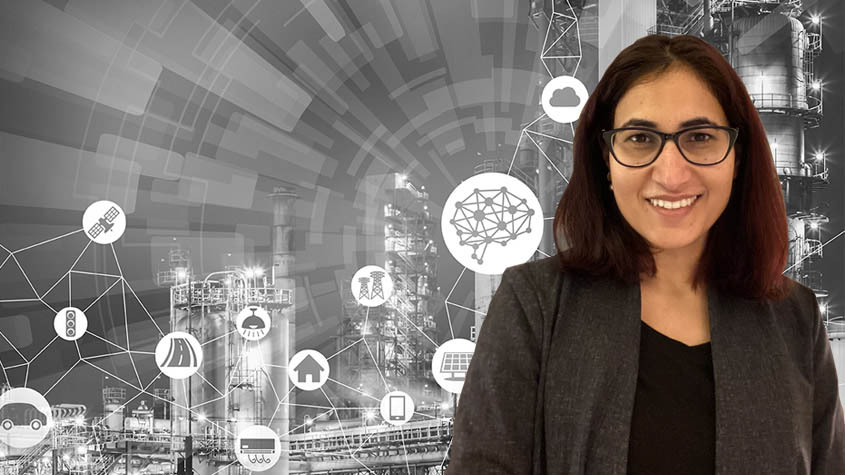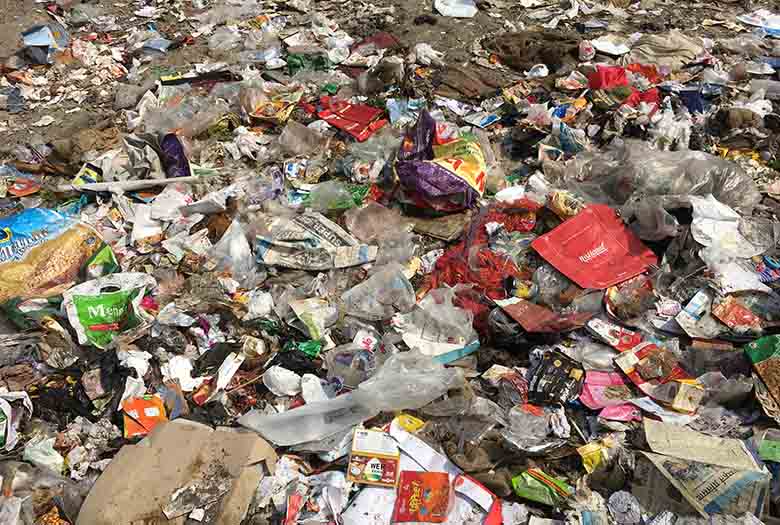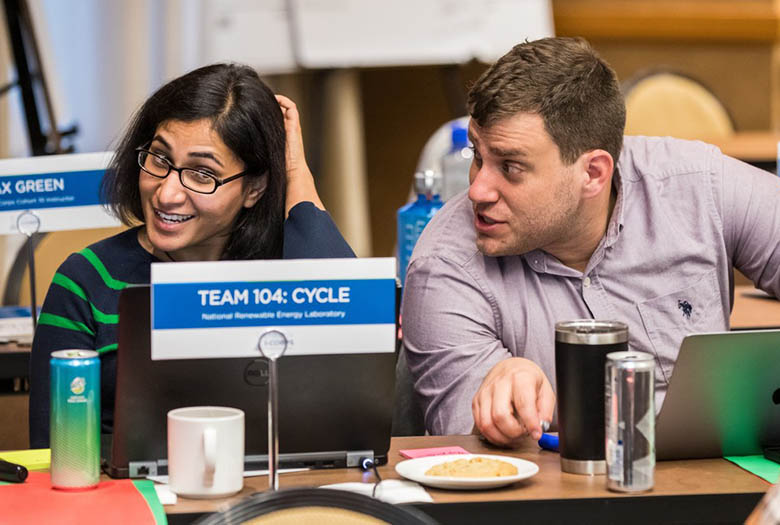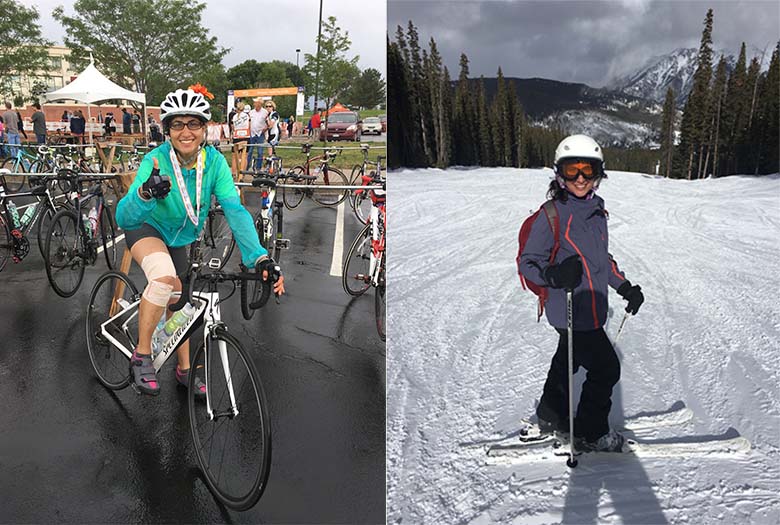Q&A With Avantika Singh: The Cautious Optimist Who Hates Waste (Like, Really Hates Waste)
Manufacturing Mastermind Series

The stench hit Avantika Singh a couple miles before she reached the mountain of trash. But she pressed on; in her mid-20s and just starting her career, she was on a mission to tour landfills, composting facilities, and other waste-processing plants in her native country of India to find out where trash and plastics go. The answer was surprising—and painful.
India’s 60% recycling rate is high, said Singh, now a chemical engineer at the National Renewable Energy Laboratory (NREL). For comparison, the United States’ recycling rate is 32%. Each U.S. citizen generates about 5 pounds of waste a day—mostly food and plastics—half of which ends up in our own landfills. But in India, poverty has built a more sustainable recycling system that is, well, unsustainable.
“It just broke my heart,” Singh said, remembering a moment on one of her tours when she saw an elderly woman, hunched and shoeless, digging through the trash to find recyclable plastics to turn in for a meager pay out. The mound hid plastics but also broken glass, and the woman’s feet were bleeding.
“At that moment, I thought, ‘If I can change any part of that, any tiny part of that, so somebody doesn't have to go through this, that’s what I’ll do,’” Singh said.
At NREL, Singh is living up to her promise. As an expert in market analysis and sustainable materials, she works with research teams to design new, cost-effective ways to manufacture and recycle plastics so they do not keep piling up in landfills. Singh is also part of the U.S. Department of Energy’s Bio-Optimized Technologies to keep Thermoplastics out of Landfills and the Environment (BOTTLE™) consortium. Together, Singh and BOTTLE hope to design future plastics from plants, for example, or from broken-down bits of common carbon-based plastics like the polyethylene terephthalate (PET) found in clothes, carpets, and bottles.
In the latest Manufacturing Masterminds Q&A, Singh talks about her twisty path to plastics, how her mother’s green thumb inspired her commitment to sustainable living, and how much she hates waste. This interview has been edited for clarity and length.
I see why that moment at the landfill was such a strong motivator for you to change how we manage plastics. But that’s a big problem to put on your shoulders. Does it ever feel overwhelming?

Yes. Sometimes the scale of the challenge is so large it can be demotivating. I've struggled a lot with that. Global warming, too—it's such a big issue. Everybody's involved. How much can one person do? It can dampen your motivation to think, “Are my actions really going to make a difference?”
I bet a lot of people feel that way. How do you handle it?
Some days are good, and others not so much, when I think, “What difference does it make? We’re all doomed anyway.” It's taken time to accept that I should keep trying to change a little bit of these colossal problems—plastics pollution and climate change—instead of trying to solve the whole thing. I can still make a small impact. That keeps me mildly optimistic.
Meaning, it helps to remind yourself that you don’t have to solve it all yourself?
Yes. Originally, I thought, “If you have a passion and a purpose, you can overcome anything.” Now, I'm beginning to realize how important it is to work with a team that shares the same vision and goals. NREL is a great place to find wonderful, amazing, smart colleagues that understand you and can help you so that the bad days seem less bad. I love the work family I have found here!
Let’s backtrack a little to find out how you ended up at NREL. Did you always know you’d be a scientist?
During lunch breaks at school in grade four, all the other kids would go out to the playground, and I was hooked on two climate change books that were introduced to my small, rural school library. I learned about renewable energy sources, like solar, wind, and tidal energy, and nonrenewable sources, like oil and coal. I thought, “Huh. So, if there are renewable sources of energy, why don’t we use them more? Why are we depleting a resource that also causes pollution?”
You could have gone into ecology or environmental science. Why chemical engineering?
Honestly, I got into chemical engineering because family friends told me it was very promising in the United States. Plus, the jobs were more widely available compared to ecology or environmental science. About 10 or so years ago, those fields weren’t that mainstream in India, perhaps because climate change awareness has only grown in the last few years. It took four years of school and an undergraduate internship with an oil refinery to definitively know that I did not want to work in oil and gas.
But you had invested so much in chemical engineering. What did you do?
I decided, “OK, let's move to the United States for a graduate degree and see what else chemical engineering has to offer. Let’s explore what’s out there.”
What did you find?
Polymers.
Aha. The building blocks of plastics. Even then, you could have gone to work for so many companies. Why NREL?

NREL was a dream job. When I met Katie Gaston and learned about her work, I remember thinking, “Ah, if only I could work here!” NREL was 100% dedicated to moving toward renewable energy. I could not think of a better place that resonated with my personal values. I took quite a lot of bumps and turns to figure out how to align my education in chemical engineering with my natural propensity to care for the environment. NREL was where I could do that.
Also, as a side note, I love that not being a U.S. citizen wasn’t a deterrent to working at a U.S. Department of Energy lab.
I’m curious. Where did your desire to care for the environment start? Did you grow up in an especially beautiful area?
I was living in a desert in a very remote part of India. I remember dust storms. You could easily get lost out there. So no, it wasn't scenic. My environmental concern probably comes from my mom. She cared for the environment. Despite the hostile weather, she maintained very pretty gardens, including a fruit and vegetable garden. She also believed in never wasting food. We were very conservative about not generating waste; we tried to reuse or recycle as much as we could, like plastics. At that time, I don’t think anybody was doing that, at least not in our remote community.
She sounds like a woman ahead of her time.
Yes. It was natural for her to think, “It's not just the immediate environment; it's people overall who are impacted.”
In a way, by finding better ways to manage plastics today, you’re continuing her vendetta against waste.
Yes. I hate waste. I absolutely hate waste. If there's anything I can do to prevent it, recycle it, or upcycle it, I want to do it. In India, waste is just scattered on the roadsides. That might be true for many developing parts of the world. If it’s a resource, let's do something with it.
Agreed! So what are you doing with it?
At NREL, I do techno-economic analysis—examining costs, benefits, and risks to determine if methods and technologies are worth the investment. Take plant-based plastics, which are only 50% carbon at best. If we’re trying to recycle our carbon into fuels or chemicals, and your starting material is 50% carbon or less, then you're not going to have a lot of carbon in the end. Current plastics, on the other hand, are about 90% carbon. Wouldn't that be a better starting point? I love working on biomass (fuels or chemicals made from plant-based materials). But it’s so expensive. We are always trying to compete with cheap fossil fuels.

So, how does manufacturing fit into your work?
My work is to redefine what plastics manufacturing looks like. Starting from plant-based materials, for example. Or building more sustainable buildings. A recycled plastic bottle will have a short lifespan, but a large building constructed with recycled materials will stay for years. That’s a big way to isolate carbon that would otherwise be in a landfill or the natural environment.
That is big. Then, are you optimistic about the future of plastics recycling?
I'm quite optimistic, though I want to be bullish. The biggest challenge is getting the plastics. Typically, of the plastic waste that ends up at a material recovery facility, only about 12% is recycled. Landfilling is way cheaper than recycling. And every state is different. There is no consistent set of rules. Consumers don't always know what is or is not recyclable. Sometimes they recycle things that can jam up the machines, like thin film plastics. But I'm still optimistic. The tide is changing. Consumers want more sustainable products. I hope the supply can meet the demand.
Clearly, we don’t have an ideal system in place. What would your ideal world look like?
When you go camping or hiking, the common motto is: Leave no trace. We pack everything in and bring everything out. As humans, we can leave a minimal trace. Zero waste is impossible, but we can try to achieve the minimum. That's the world I want. People living in zero-energy homes, recycling, composting, and being in good harmony with nature.
Is that something you’re doing in your personal life?
I live in an apartment in San Francisco, so l can only do so much. I choose an electricity supplier that has more renewable energy in the grid. I compost, recycle, and make sure my trash is the smallest it can be. I shop sustainably; I don’t jump on every fast fashion trend; I buy food from local farmer’s markets. A lot of people don't realize food waste alone generates so many methane emissions, which is about 20 times worse than carbon dioxide. Also, red meat has a terrible environmental footprint (if not taste). Every day, every individual can do some things.
What advice would you give people like you, who want to care for the environment through their work?
Renewable energy or sustainability might not be everyone's passion or purpose. But be open minded and explore. Reach out to people far and wide to see what else is out there and who does what. The world is bigger than you might think.
Interested in building a clean energy future? Read other Q&As from NREL researchers in advanced manufacturing, and browse open positions to see what it is like to work at NREL.
Learn more about NREL’s work to reinvent plastics manufacturing, recycling, and upcycling as part of the BOTTLE Consortium.
Last Updated Jan. 22, 2026
